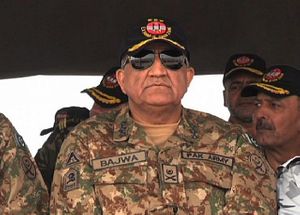The history of India-Pakistan relations show that, every time an attempt is made to build relations, Pakistan’s army sabotages the peace talks by either escalating tensions at the Line of Control (LoC) or sending trained militants to India to launch attacks. On January 2, 2016, for example, a heavily armed group from Pakistan attacked the Indian Air Force base in Pathankot. This attack came immediately after Indian Prime Minister Narendra Modi’s impromptu visit to Lahore to meet his counterpart, Nawaz Sharif. This was followed by another attack carried out on September 18, 2016, where four heavily armed militants, belonging to Jaish-e-Mohammed, managed to cross the porous border and launch a surprise attack on an army camp in Uri in Jammu and Kashmir, resulting in the deaths of 17 soldiers.
Another worrying recent development was the release of Hafiz Saeed, of the banned Jamaat-ud-dawa, one of the masterminds of the 2008 Mumbai terrorist attack, where over 160 lost their lives. Saeed was released by the Lahore High Court due to the failure of the government, probably under pressure from the army, to produce evidence in court.
However, in spite of the continued hostility, both India and Pakistan did keep the composite dialogue going through their national security advisers. Sadly, both countries are now experiencing a low point in their relations, with a virtual breakdown of the mechanism set afloat in Lahore to settle disputes through dialogue.
Pakistan needs to review its strategy of waging a proxy war with the help of militants to create disorder and mayhem in Kashmir. This strategy has proved counterproductive, besides inviting international condemnation. Recently, the Indian army has managed to neutralize the militants sent across the border; more than 190 militants have perished this year alone.
The best way forward is to look for “out of box solutions” to solve this complex problem. One way would be to grant autonomy to the people of Kashmir (on both sides of the border), so that there is free movement of people and trade on both sides of the valley. This will help in reducing the mistrust between the two countries.
It is in this context that Pakistan’s Chief of Army Staff General Qamar Bajwa’s first briefing to the Senate Committee assumes significance, mainly on two counts. First, he indirectly accepted the supremacy of the parliament. According to Dawn, Bajwa’s appearance at the briefing suggests “that the military is aware that the constitutional order and national security need to be strengthened by inter-institutional cooperation.” Second, in a major shift in the army’s ostrich approach on Pakistan’s India policy, he told the Senate to improve ties with India. However, when asked about Hafiz Saeed, the general replied that the Islamist leader was free to pursue the Kashmiri cause. This has caused confusion in India about Bajwa’s real intentions.
Be that as it may, both India and Pakistan should welcome this development, as the general’s briefing could mark a historic departure in the Pakistan Army’s attitude toward India.
Due to the complexity of the disputes, especially over Kashmir, no immediate settlement is possible, but talks can go a long way in easing the tensions between the two countries. It is here Pakistan can learn from China and India, which, while continuing to explore ways to settle their border disputes, have attempted to improve trade and commerce. In the last five decades, since the 1962 war, not a single bullet has been fired by both sides, despite several tense encounters. Contrast this with India and Pakistan, where cross-border shelling has become the order of the day.
At a time when there is tension in many parts of the world, there is now an urgent need to make sincere and genuine attempts to improve bilateral ties, as this will bring peace and prosperity to the people of both countries.
We have seen in the past that attempts to boost ties — such as the composite dialogue, Lahore-Delhi bus service, and opening of cross-LoC trade in both India- and Pakistan-administered Kashmir — did contribute in the easing of tensions between the two countries, though for a very short period. It now depends on the matured leadership of both countries to take the relationship forward in a meaningful and constructive way. It may be a worthwhile to include the army representatives from Pakistan in all future peace talks to get their unbridled support. Both countries should forget the bitter past and work toward ending the hostility.
Let 2018 mark a new chapter in India-Pakistan relations.
K.S. Venkatachalam is an independent columnist and political commentator.

































